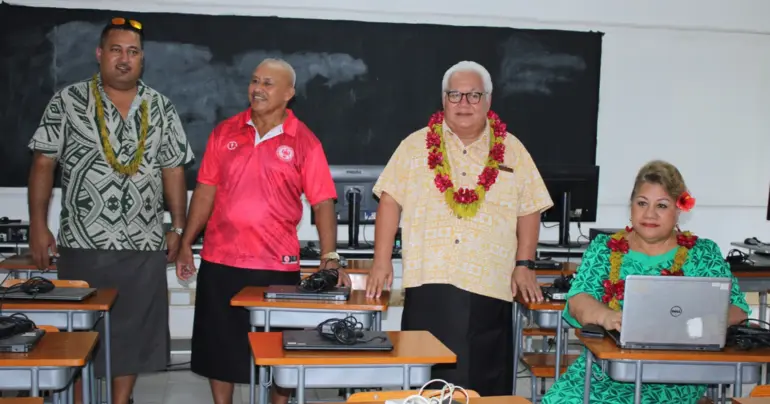Pacific countries discuss progress of environmental agreements at Vailima
A regional meeting being held in Samoa this week is reviewing the results of the A.C.P. Multilateral Environmental Agreements (M.E.As) capacity building project and it also serves as the first review meeting of the Inform project.
Both meetings are hosted at S.P.R.E.P. headquarters Vailima, and are being coordinated by the Environmental Monitoring and Governance Programme (E.M.G.) of S.P.R.E.P.
The A.C.P.M.E.A.2 project is funded by the European Union (E.U.) and the Global Environment Facility (G.E.F.) funds the Inform project. The two projects complement each other and are implemented through UN Environment and executed by S.P.R.E.P.
Deputy Prime Minister, Fiame Naomi Mata’afa, acknowledged the continued support of the European Union and the Global Environment Fund in building Pacific island capacities and efforts to improve the management of our environment and natural resources.
“The invaluable support and assistance provided by the U.N. Environment programme and S.P.R.E.P. in this regard are greatly appreciated, as each of our countries have benefitted from opportunities to strengthen our engagement at international conferences, particularly those related to the UN conventions on climate change, biodiversity, and lad degradation and other related multi-lateral environment agreements,” she said.
“Using the Blue Pacific narrative that the Leaders endorsed at their meeting in Samoa last year, you would be well placed to build on and strengthen the successes of the A.C.P.M.E.A.2 programme and Inform Project to deliver on national and regional priorities.”
“Samoa has benefited from the assistance and support provided through the EU ACP-MEA project, including the development of Samoa’s 2013 State of Environment (SoE) Report. This Report was used as a basis to inform our National Environment Sector Plan coordinated by the Ministry of Natural Resources and Environment.”
S.P.R.E.P. Officer In Charge, Dr. Vicky Hall, welcomed participants on behalf of the Director General, and said that S.P.R.E.P. has come along way and have achieved notable achievements in the last 25 years which include results and achievements delivered through the A.C.P.M.E.A. programme, and more recently through the Inform project.
“The A.C.P.M.E.A. programme responds directly to specific capacity needs of Small Island States which include negotiation skills, capacity to develop policies and daft laws, environmental impact assessment and mainstreaming of environmental issues into key planning processes of government, establishing a good understanding of the state of environment, meeting M.E.A. reporting which are essential building blocks for well-informed planning and decision-making.
The primary objective of the A.C.P.M.E.A. programme for the Pacific is to strengthen and enhance the capacity of Pacific A.C.P. countries to effectively implement biodiversity related M.E.A.s and meet their reporting obligations. S.P.R.E.P. serves as the Pacific Hub for the Pacific A.C.P. component of the ACPMEA programme and the objectives of the A.C.P.M.E.A. programme are aligned to, and integrated into SPREP’s Strategic Plan 2017-2026.
Dr. Hall also acknowledged the contribution of the A.C.P.M.E.A. programme in leveraging new funding from G.E.F. which resulted in the regional GEF Informed project implemented through U.N. Environment and executed by S.P.R.E.P.
Speaking on behalf of the UN Environment, Mr. Sefanaia Nawadra acknowledged the strong partnership between S.P.R.E.P, U.N. Environment and Pacific island countries in developing and implementing policies to protect the environment. “The Pacific island countries are stepping up and requesting assistance to manage environmental data. This is a significant development for countries to help get the information they need for their reporting requirements including the S.D.Gs, S.A.M.O.A pathway and others.”
The Inform project is assisting Pacific island countries to enhance their reporting capacity to the various multilateral environmental agreements (M.E.As) including key international commitments. This is done through addressing the on-going challenge of compiling high-quality, and up to date data on the environment including a place to store data.
National environmental data portals are established in14 Pacific island countries of the Cook Islands, Federated States of Micronesia, Fiji, Kiribati, Republic of the Marshall Islands , Nauru, Niue, Palau, Papua New Guinea , Samoa, Solomon Islands, Tonga, Tuvalu, and Vanuatu.
The development of national data portals will help enhance the monitoring and evaluation of environment work undertaken in the region by providing reliable access for national datasets and indicators for environment information.
The meeting this week will further build capacities and enhance awareness and understanding of the importance of environmental data management in supporting planning and decision-making, as well as the need to strengthen national and international reporting efforts.
The discussions this week will also consider opportunities through data management to further strengthen and support countries engagement and participation at international M.E.A. negotiation processes.











